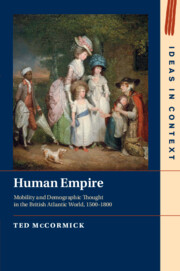Book contents
- Human Empire
- Ideas in Context
- Human Empire
- Copyright page
- Dedication
- Contents
- Acknowledgments
- Introduction Transformations in Demographic Thought
- Chapter 1 Mobility and Mutability in the Early Tudor Body Politic
- Chapter 2 Marginality, Incivility and Degeneration in Elizabethan England and Ireland
- Chapter 3 Beyond the Body Politic: Territory, Population and Colonial Projecting
- Chapter 4 Transmutation, Quantification and the Creation of Political Arithmetic
- Chapter 5 Improving Populations in the Eighteenth Century
- Conclusion Malthus, Demographic Governance and the Limits of Politics
- Afterword
- Bibliography
- Index
Chapter 1 - Mobility and Mutability in the Early Tudor Body Politic
Published online by Cambridge University Press: 14 April 2022
- Human Empire
- Ideas in Context
- Human Empire
- Copyright page
- Dedication
- Contents
- Acknowledgments
- Introduction Transformations in Demographic Thought
- Chapter 1 Mobility and Mutability in the Early Tudor Body Politic
- Chapter 2 Marginality, Incivility and Degeneration in Elizabethan England and Ireland
- Chapter 3 Beyond the Body Politic: Territory, Population and Colonial Projecting
- Chapter 4 Transmutation, Quantification and the Creation of Political Arithmetic
- Chapter 5 Improving Populations in the Eighteenth Century
- Conclusion Malthus, Demographic Governance and the Limits of Politics
- Afterword
- Bibliography
- Index
Summary
Chapter 1 examines demographic ideas in early Tudor England, centering on connections between the mobility and mutability of particular groups of people. It first delineates sources for demographic ideas, in particular the Bible and Aristotle’s Politics, and emphasizes the centrality of qualitative concerns about multitudes of people as a factor in the health of the polis. It then turns to a major context for English demographic thought, the enclosure of land from the late fifteenth century. It delineates a key theme in the sixteenth- and seventeenth-century literature of agrarian complaint, detailed in More’s Utopia: causal links between enclosure and depopulation (the removal of a functional multitude from a specific locale) and between mobility and degeneration (here, of ploughmen displaced by enclosure into criminals). The final section looks at the development – in Thomas Starkey’s Dialogue between Pole and Lupset, Thomas Smith’s Discourse of the Common Weal, and an anonymous set of “Polices” – of an idea of policy centered on restricting mobility to prevent degeneration and maintain proportions and relations between functional multitudes as components of the body politic.
Keywords
- Type
- Chapter
- Information
- Human EmpireMobility and Demographic Thought in the British Atlantic World, 1500–1800, pp. 25 - 60Publisher: Cambridge University PressPrint publication year: 2022



